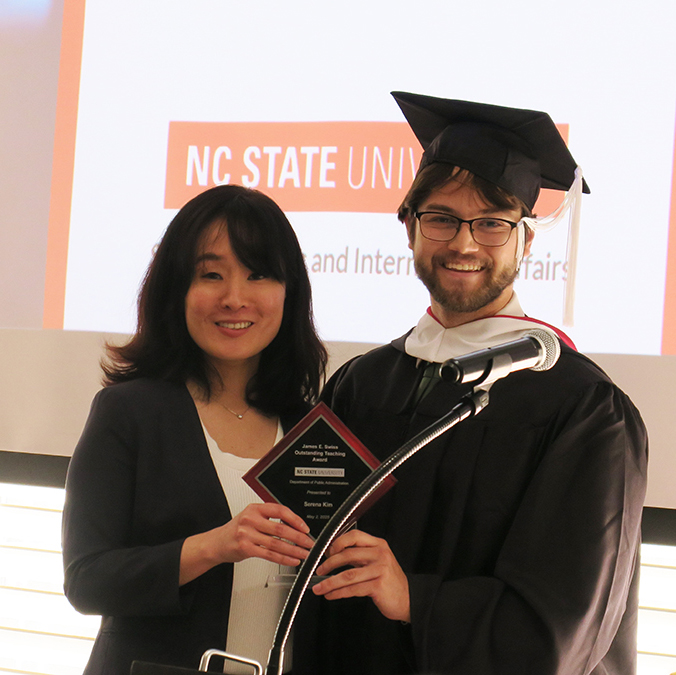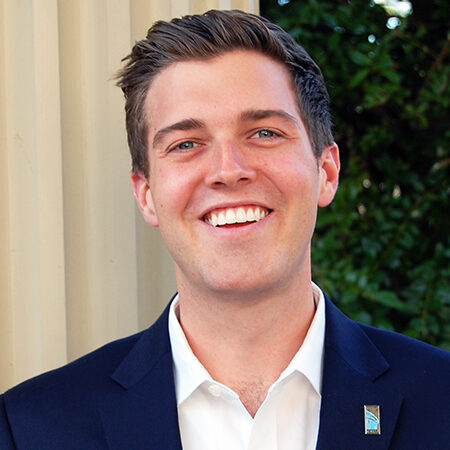Ph.D. in Public Administration
Fostering the next generation of intellectual leaders
who will define the study and practice of public and
nonprofit management and policy
Program Overview
About Us
Established in 1997, the PhD in Public Administration offered by the Department of Public Administration in the School of Public and International Affairs at NC State remains the only Ph.D. program in North Carolina offered in this field. Since its establishment, the program has sought to strengthen and expand contributions to the field of public administration.
Our vision is to foster the next generation of intellectual leaders who will define the study and practice of public and nonprofit management and policy. We provide students with strong foundations in both teaching and research to ensure their success.
Although our program is smaller, we are a close-knit community that values collaboration and excellence in the work we do.

Excellent mentorship. Students begin their first year paired with a faculty member on a research project. In their second year, they are paired with a teaching mentor. This gives our students a strong footing to develop their research interests before taking on the demands of the classroom.
Virtual Information Sessions
Register for one of our Virtual Information Sessions held via Zoom using the links below to learn more about the PhD program. You’ll have an opportunity to hear from faculty, current students, and alumni about the program and learn about the application process.
Explore:
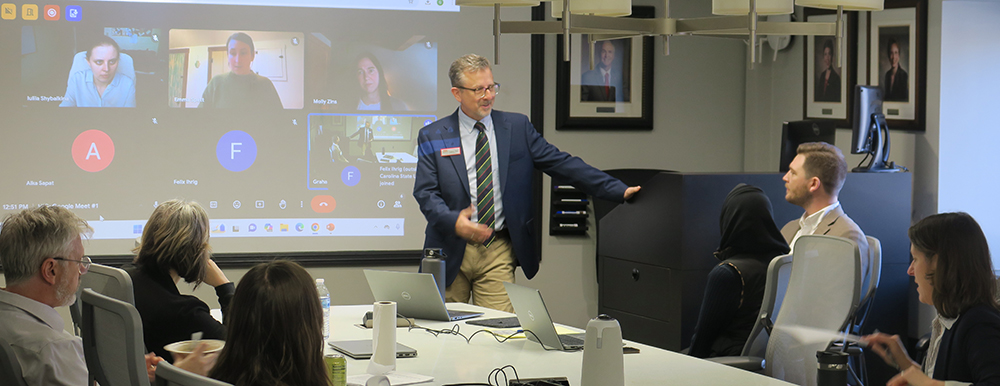
Degree Requirements
The Ph.D. in Public Administration requires the completion of 72 graduate credit hours, including 60 credit hours of coursework and 12 credit hours of dissertation research. Students having obtained a master’s degree in a relevant discipline prior to enrollment in the Ph.D. program may be approved for up to an 18-credit hour reduction, reducing the total to 54 graduate credit hours.
More than 94% of our Ph.D. alumni currently work in academic, research or public service roles.
A typical degree breakdown is as follows:
- Transfer Credit from Master’s Degree: 18 credits
- Core Courses: 24 credits
- Management Specialization: 6 credits
- Methods Elective: 3 credits
- Elective Courses: 9 credits
- Dissertation Courses: 12 credits
Additional requirements include presenting a conference paper or publishing an article in a scholarly journal, passing preliminary written exams, passing the prospectus defense, and passing the dissertation defense. Degree details can be found in the Ph.D. handbook.
2025 PhD Handbook (coming soon)
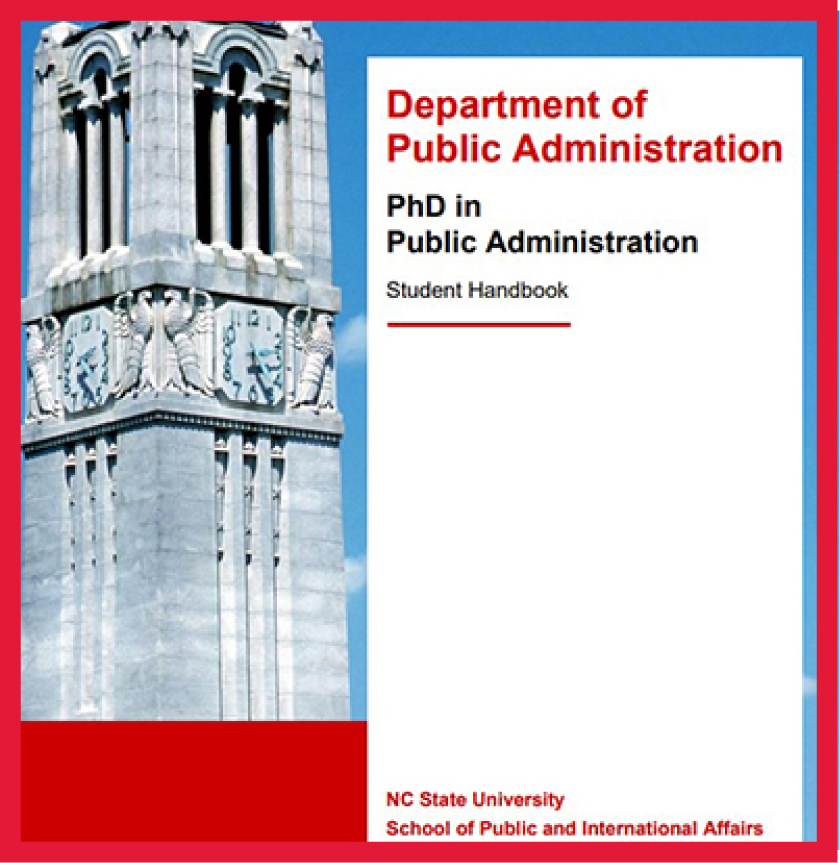
Core Courses
- PA 715: Quantitative Policy Analysis (Fall)
- PA 761: Foundation of Public Administration (Fall)
- PA 762: Public Organization Theory (Spring)
- PA 763: Public Policy Process (Fall)
- PA 765: Quantitative Research in Public Administration (Spring)
- PA 766: Advanced Quantitative Research in Public Administration (Fall)
- PA 798: Special Topics: Public Administration Research Methods and Traditions (Fall)
- PA 803 – Advanced Research Design (Fall)
Elective Courses
- PA 771: Seminar on Nonprofit Organizations
Program Objectives
The Public Administration Ph.D. program is designed to prepare students for teaching and research in public management and related fields. Secondarily, the degree is meant to prepare research specialists for governmental agencies and public affairs institutes.
While there are substantive overlaps in the skills needed to land academic, government, or industry positions, there exist ways to tailor the graduate school experience and curate your professional profile to the job market of your choosing.
These are our program objectives:
Produce students who are skilled researchers and teachers
- Students are expected to develop their skills as future teachers and researchers through teaching or research assistantships.
- Students are expected to develop as scholars through paper presentations and other participation in conferences.
- Students are expected to develop as scholars through submitting articles and book chapters for publication.
- Students are expected to have the foundation knowledge in public administration theory and classic literature that will enable them to conduct significant research.
- Students are expected to have the foundation knowledge in research methods that will enable them to conduct significant research.
Establish a successful graduate program with national and international visibility
- Program faculty are expected to attract, secure, and retain high-quality students.
- Program faculty are expected to develop graduates who establish strong publication records.
- Faculty will conduct a program that produces both recent graduates and longer-term alumni who are satisfied with their professional preparation.
- Faculty are expected to contribute to knowledge production in their fields through publications and conference presentations.
- The faculty, both individually and collectively, are expected to enhance the program’s reputation.
Develop students as effective researchers
- Students should be able to identify a research problem whose solution will be a valuable contribution to the field.
- Students should be able to review and critique the literature in an area of study in a manner that demonstrates mastery of the pertinent research.
- Students should be able to effectively apply methods of the field to solve research problems.
- Students should be able to interpret data and to draw well supported conclusions from the data.
- Students should be able to communicate research effectively in writing.
- Students should be able to communicate research effectively in oral presentations.
Competency Guide
- Organization Theory
- Foundations
- Policy
- Methods
Dissertation Information
To review completed dissertations, please follow the following link and select “Public Administration” in the “by discipline” field. All completed dissertations will be displayed.

Tuition and Fees
NC State University is a state institution and tuition rates are first set by the UNC Board of Governors and then approved by the North Carolina General Assembly. NC State’s Student Services Center’s Graduate Students page posts the most current and up-to-date tuition rates. Tuition and fees are charged at the beginning of the semester; additional mandatory health insurance charges will be billed unless you waive out of the premium charge.
The NC State Student Services Center provides many helpful tools for planning for your graduate finances, including a Graduate Student Estimated Cost of Attendance webpage to give you an estimate of annual expenses for full-time graduate students in different living situations as well as a Scholarship and Financial Aid page.
Teaching and Research Assistantships
The program offers selected full-time students with financial aid assistantship packages funded through the Graduate Student Support Plan (GSSP), which includes tuition (but not required fees), health insurance, and a living stipend. This package comes with a 20-hour/week assistantship requirement. Student assignments may include teaching assistantships, instructor of record assistantships, or research assistantships. Normally, all full-time PhD students are eligible for this support for up to four years, pending funding availability and satisfactory student performance.
Faculty
The department of Public Administration is proud of its dedicated faculty and their commitment to student success. We have 14 full-time tenured and tenure-track faculty.
Our faculty maintain a number of important strategic relationships across campus, and specialize in subjects such as: collaborative governance, emergency and natural disaster response, public safety leadership, public management, public policy, sustainable energy systems and policy, genetic engineering, multi-agent collaboration and inter-organizational relationships, wicked problem solving, phosphorous sustainability, international non-governmental organizations, and nonprofit management and leadership. You can read more about them on our faculty webpage.
Recent Faculty Research
Our faculty publish on a wide variety of topics. Recent publications include:
- Thomas Birkland studies the impact of memorable messages during the first year of COVID-19
- Thomas Birkland on Narrative Power in the Narrative Policy Framework
- Jerrell Coggburn on Volunteers in Name Only: Implications of Court-Ordered Service
- Serena Kim on Sentiment Analysis of Solar Energy in U.S. Cities
- Jennifer Kuzma on Natural vs. Genetically Engineered Microbiomes: Undertanding Public Attitudes for Indoor Applications
- Jennifer Kuzma on Taking the Temperature of U.S. Public Regarding Microbiome Engineering
- Branda Nowell on The Weakness of Weak Ties: Do Social Capital Investments Among Leaders Pay Off During Times of Disaster?
- Jay Rickabaugh on How North Carolinians Cooperate to Rebuild After Hurricane Helene
- Jay Rickabaugh on Teaching Early Undergraduate Transdisciplinary Education in Public Affairs for Non-Majors
- Hanz Peter Schmitz on A Framework for Understanding and Evaluating Localization: The Care of HelpAge International
Student publications
Program Outcomes
Placements. Our graduates continue to find strong career placements in academia and research-focused sectors. More than half of our graduates end up in higher education. Recent graduates are now working at Duke University, the National University of Singapore, Northeastern University, San Jose State University, University of Charleston, University of Colorado at Colorado Springs, University of Nebraska at Omaha, University of Nevada, and several now teach at the University of North Carolina at Chapel Hill. They make important contributions to scholarly literature – our graduates have published hundreds of articles in peer-reviewed journals and have more than 20,000 citations.
Alumni. The program, in its 28th year, proudly graduated its 100th student in Spring 2025, and we have many active alumni that stay in touch with student life on campus. Our alumni now work at various well-established universities in the U.S., as well as serve in key positions in places such as the NC General Assembly, the North Carolina Department of Commerce, the NC Department of Labor, the U.S. Census Bureau, and in local area governments.
Testimonials
Yinman Zhong, (PhD 2025)
“I really appreciate the close mentorship in the Ph.D. program. I am grateful for the help I’ve received from all my professors over the past four years, especially my advisor, Dr. Mandi Stewart! Dr. Stewart has provided me with tremendous support throughout the whole process, not only by offering valuable guidance on my dissertation, but also by being there for me every step of the way in graduate school. I truly couldn’t have done this without her. She is my role model as an advisor, and I aspire to carry forward that same spirit and be a caring and supportive mentor to my students, just as she has been to me.”
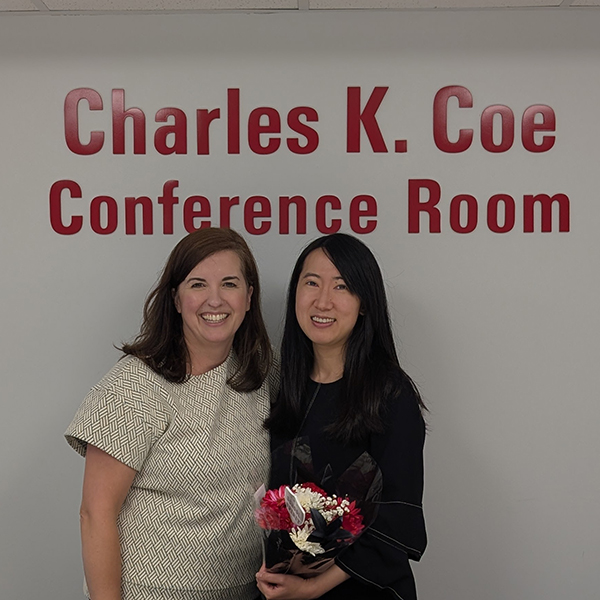
“Earning a Ph.D. in Public Administration from NC State was instrumental in my career journey. The rigorous research training honed my analytical and critical thinking skills, enabling me to tackle complex organizational and policy challenges with clarity and precision.
Meredith Weinstein
2002 PhD Graduate, Evaluation and Accountability Coordinator, NC State Extension


